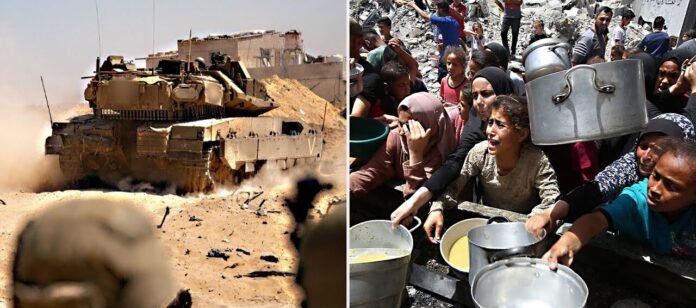UN chief warns five aid lorries allowed into Gaza won’t stave off famine as Israel vows total military takeover
Israel has allowed five United Nations aid lorries to enter Gaza after an 11-week blockade, but the UN quickly condemned the move as inadequate to address the urgent needs of 2.1 million Palestinians, highlighting the ongoing Gaza aid crisis.
The delivery—mostly baby food—came through the Kerem Shalom crossing on Monday, following pressure from US senators. But UN humanitarian chief Tom Fletcher called the action “a drop in the ocean of what is urgently needed”, with global experts warning of imminent famine in the besieged territory.
Prime Minister Benjamin Netanyahu acknowledged the move was not rooted in humanitarian concern, but was necessary to avoid diplomatic fallout. “We must not reach a situation of famine, both from a practical and diplomatic standpoint,” he said in a video, adding that Israel would continue minimal aid shipments only until its military and private contractors could distribute supplies under a US-backed plan, which the UN has rejected.
Simultaneously, Israeli forces pressed on with their ground offensive against Hamas, killing at least 40 people in air strikes on Monday. Among them were five displaced civilians sheltering in a school in Nuseirat refugee camp. The Israeli military claimed it targeted Hamas operatives in a command centre.
The IDF has issued evacuation orders for the city of Khan Younis, preparing for what it called an “unprecedented attack.” Netanyahu declared Israel would take control of “all areas” of the Gaza Strip.
Israel had sealed off Gaza on 2 March, resuming military operations two weeks later and effectively ending a ceasefire. The blockade and bombardment have left over 3,000 more dead and displaced 400,000 people. Last week, the Hamas-run health ministry reported 57 children had died of malnutrition, and UN-backed experts warned that half a million Gazans face starvation.
Despite Israeli claims that thousands of lorries entered Gaza during the ceasefire and that Hamas had looted aid, the UN insists Tel Aviv is legally bound to ensure sufficient food and medicine reach civilians. Israel’s new plan, which bypasses the UN and relies on security contractors and a new Gaza Humanitarian Foundation, has been heavily criticised by international aid groups.
Chef José Andrés, head of the US charity World Central Kitchen, said the new plan “will leave Palestinians hungry” and dismissed Israel’s claim that distribution centres could be ready in a week. “This is not true. It will take weeks,” he posted on X.
UN officials say they have 8,900 lorries of aid ready to move and a reliable distribution system already in place. But they refuse to cooperate with Israel’s alternative, warning it would exclude vulnerable populations, force displacement, and set a dangerous precedent for future humanitarian crises.
Inside Gaza, desperation grows. Abd al-Fatah Hussein, displaced with his wife and two children, said they survive on one meal a day, rationing what little they can find. “Getting food, medicine, hygiene products—almost impossible,” he said.
Netanyahu defended his approach by citing conversations with US senators who warned that images of starvation would erode support for Israel. “We need to provide a minimal, basic bridge—just enough to prevent hunger,” he said, calling the new method a temporary necessity.
Far-right Israeli ministers, including Itamar Ben-Gvir and Bezalel Smotrich, condemned the decision. Smotrich urged focus on the broader aim: forcing Palestinians into southern Gaza and, “with God’s help, to third countries”.
In a rare joint rebuke, the leaders of the UK, France and Canada—Keir Starmer, Emmanuel Macron, and Mark Carney—slammed Israel’s limited aid as “wholly inadequate”, threatening further action if the military offensive and blockade continue. Netanyahu fired back, accusing them of trying to end a “defensive war” and rewarding the 7 October Hamas attack.
Meanwhile, indirect ceasefire talks in Qatar have stalled. Israel insists only the return of its remaining 58 hostages—23 believed alive—can halt its campaign. The death toll in Gaza has now surpassed 53,000, according to the local health ministry.
